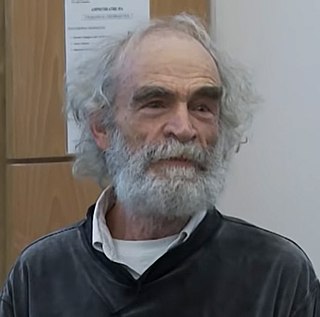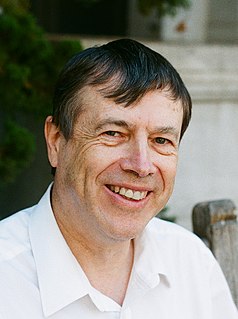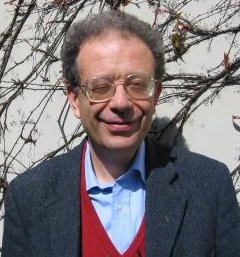Related Research Articles

Laurent-Moïse Schwartz was a French mathematician. He pioneered the theory of distributions, which gives a well-defined meaning to objects such as the Dirac delta function. He was awarded the Fields Medal in 1950 for his work on the theory of distributions. For several years he taught at the École polytechnique.
In physics, Ginzburg–Landau theory, often called Landau–Ginzburg theory, named after Vitaly Ginzburg and Lev Landau, is a mathematical physical theory used to describe superconductivity. In its initial form, it was postulated as a phenomenological model which could describe type-I superconductors without examining their microscopic properties. One GL-type superconductor is the famous YBCO, and generally all Cuprates.

Mikhael Leonidovich Gromov is a Russian-French mathematician known for his work in geometry, analysis and group theory. He is a permanent member of IHÉS in France and a Professor of Mathematics at New York University.

Jean, Baron Bourgain was a Belgian mathematician. He was awarded the Fields Medal in 1994 in recognition of his work on several core topics of mathematical analysis such as the geometry of Banach spaces, harmonic analysis, ergodic theory and nonlinear partial differential equations from mathematical physics.
The Bôcher Memorial Prize was founded by the American Mathematical Society in 1923 in memory of Maxime Bôcher with an initial endowment of $1,450. It is awarded every three years for a notable research memoir in analysis that has appeared during the past six years in a recognized North American journal or was authored by a member of the Society. This provision, introduced in 1971 and modified in 1993, is a liberalization of the terms of the award. The current award is $5,000.

Louis Nirenberg was a Canadian-American mathematician, considered one of the most outstanding mathematicians of the 20th century.

Clifford Henry Taubes is the William Petschek Professor of Mathematics at Harvard University and works in gauge field theory, differential geometry, and low-dimensional topology. His brother is the journalist Gary Taubes.
Haïm Brezis is a French mathematician, who mainly works in functional analysis and partial differential equations.

Jean-Michel Bismut is a French mathematician who has been a Professor at the Université Paris-Sud since 1981. His mathematical career covers two apparently different branches of mathematics: probability theory and differential geometry. Ideas from probability play an important role in his works on geometry.

Leon Melvyn Simon, born in 1945, is a Leroy P. Steele Prize and Bôcher Prize-winning mathematician, known for deep contributions to the fields of geometric analysis, geometric measure theory, and partial differential equations. He is currently Professor Emeritus in the Mathematics Department at Stanford University.

Stefan Müller is a German mathematician and currently a professor at the University of Bonn. He has been one of the founding directors of the Max Planck Institute for Mathematics in the Sciences in 1996 and was acting there until 2008.

Jean-Michel Coron is a French mathematician. He first studied at École Polytechnique, where he worked on his PhD thesis advised by Haïm Brezis. Since 1992, he has studied the control theory of partial differential equations, and which includes both control and stabilization. His results concern partial differential equations related to fluid dynamics, with emphasis on nonlinear phenomena, and part of them found applications to control channels.
Sylvia Serfaty is a French mathematician working in the United States. She won the 2004 EMS Prize for her contributions to the Ginzburg–Landau theory, the Henri Poincaré Prize in 2012, and the Mergier–Bourdeix Prize of the French Academy of Sciences in 2013.
Frédéric Hélein is a French mathematician. He is university professor at Paris Diderot University.

Jürgen Jost is a German mathematician specializing in geometry. He has been a director of the Max Planck Institute for Mathematics in the Sciences in Leipzig since 1996.

Tristan Rivière is a French mathematician, working on partial differential equations and the calculus of variations.
Michelle Schatzman (1949–2010) was a French mathematician, specializing in applied mathematics, who combined research as a CNRS research director and teaching as a professor at the Claude Bernard University Lyon 1.
Jean Écalle is a French mathematician, specializing in dynamic systems, perturbation theory, and analysis.

Sergei Borisovich Kuksin is a French and Russian mathematician, specializing in partial differential equations (PDEs).
Joel Spruck is a mathematician, J. J. Sylvester Professor of Mathematics at Johns Hopkins University, whose research concerns geometric analysis and elliptic partial differential equations. He obtained his PhD from Stanford University with the supervision of Robert S. Finn in 1971.
References
- ↑ Bethuel, Fabrice (1998). "Vortices in Ginzburg-Landau equations". Doc. Math. (Bielefeld) Extra Vol. ICM Berlin, 1998, vol. III. pp. 11–19.
- ↑ "Bethuel Receives Mergier-Bourdeix Prize" (PDF). Notices of the AMS. 50 (10): 1257. November 2003.